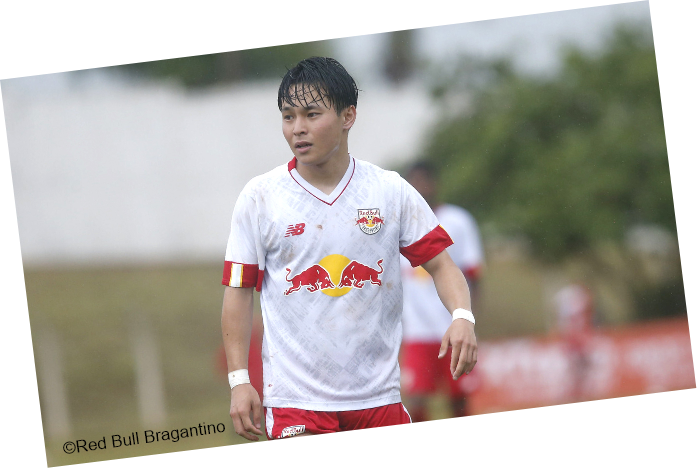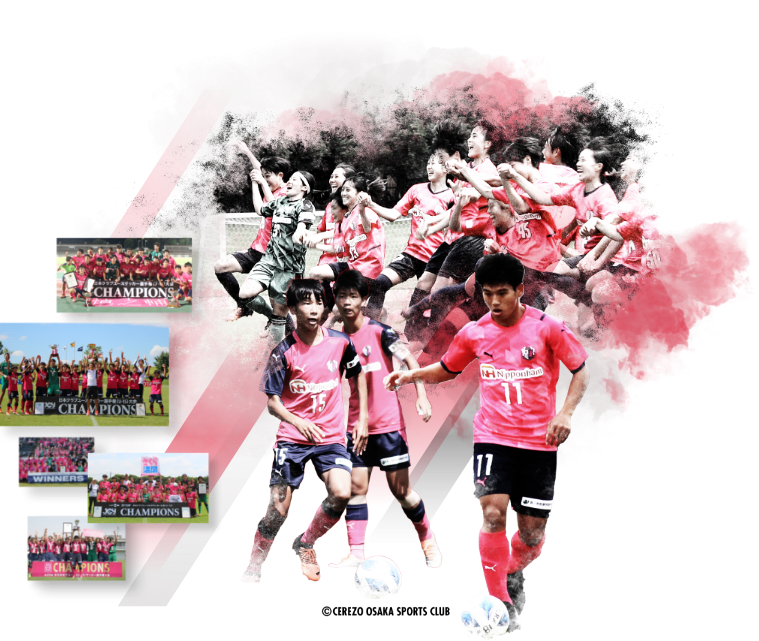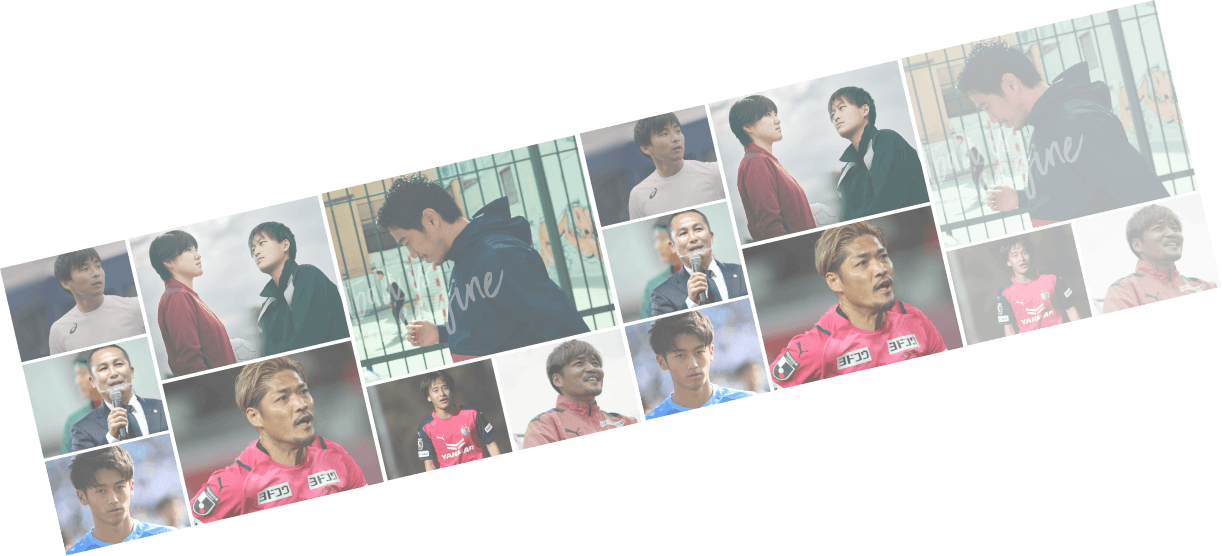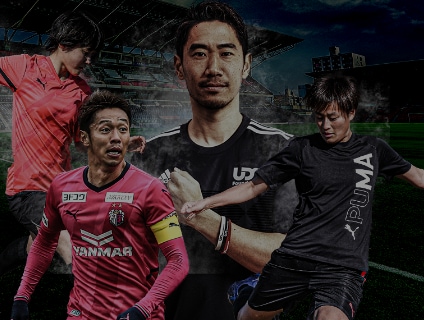
Kosei Okazawa’s

“It’s My Job to Help the Team Win”19-Year-Old Kosei Okazawa Takes on #10 for Red Bull Bragantino
Committed to representing #10 with strong determination in the Copinha, the gateway for young players
Kosei Okazawa is a Japanese footballer who wears jersey number 10 for Red Bull Bragantino U-20, a member of the Brazilian professional football league Campeonato Brasileiro Série A. Last year, the midfielder was promoted from Cerezo Osaka Academy to the top team and has been on loan to Bragantino since September.
This loan came about due to Yanmar, which has historical ties with Brazil, becoming a premium partner of the club starting in the 2022-23 season. The Yanmar Group established its first overseas subsidiary in São Paulo, Brazil in 1957, and since then Yanmar has contributed to the lives of the Brazilian people and the development of industry in Brazil. In the field of football, the Yanmar Diesel Football Club (the predecessor of Cerezo Osaka) was actively involved in exchanges with Brazilian football clubs and fielded Brazilian players such as Nelson Yoshimura.
Kosei Okazawa
 Brazilian team Red Bull Bragantino
Brazilian team Red Bull Bragantino
Born October 22, 2003. 19 years old. From Osaka City, Osaka. Cerezo Osaka Entry Class Osaka West Campus → Owada SSC → Cerezo Osaka Nishi U-15 → Cerezo Osaka U-18 → Cerezo Osaka (Category 2). Promoted to top team in 2022. Loaned to Brazilian team Red Bull Bragantino in September 2022. Competed in 30 J3 League games, 3 cup games (1 goal), and 3 Emperor’s Cup games.

Okazawa is currently competing in the Copa São Paulo de Juniores and Copinha (U-20 cup), which is considered the gateway to becoming a “golden egg” of Brazilian football. While his loan period was originally meant to end on December 25, he accepted a request to stay on and compete in the cup.
“I have been entrusted with number 10. I am taking on this competition with very strong determination.”
This 9th installment of “The Power of Cerezo Osaka Academy” will focus on Kosei Okazawa, a player who was brought up and continues to grow in the football kingdom.
I wanted to play internationally, but it’s not that easy
Red Bull Bragantino is a Brazilian football club whose hometown is Bragança Paulista, located 90 km north of São Paulo. Founded in 1928 as CA Bragantino, the club was acquired by Red Bull Brazil in 2019. After winning the Série B championship in the 2019 season, the club was promoted to Série A. Since then, Red Bull Bragantino has made notable progress, coming runner-up in the 2021 Copa Sudamericana, a South American club team tournament.

- You were loaned to Red Bull Bragantino last summer. How did you feel when you heard this news, and what was your first impression of the area?
- My biggest feeling was surprise, mostly because I had never been overseas before. I was familiar with Brazilian players, but I had no idea what a Brazilian league would actually be like. When I first arrived at the facilities, I felt that it was rich in nature and the dormitory was quite spacious. In addition to three football pitches, there was also a court for futsal or basketball on premises. In addition, there were also facilities for strength training, medical checkups, and more, and it gave the impression of being an environment that was very conducive to concentrating on football. Since the environment was so conducive to concentrating on football 24 hours a day, a week after arriving, I was already convinced that I could grow as a player if I played here.
- It was a new environment as well as a new language. How did you adapt?
- The language was the hardest part. My teammates tried to talk to me, but I didn’t know what they were saying. So I studied the language some by myself and got some help from the staff, and was gradually able to understand more of what my teammates were saying. It feels good to be able to communicate, and understanding what each other is thinking is also important in football.
- Personal growth is just as important as playing when you’re on loan overseas.
- Compared to when I was in Japan, I talk to those around me more, or rather, I tend to start more conversations with my teammates now. The norm in Japan is not the norm in Brazil, so I feel like being trained in a different environment has allowed me to grow on a personal level as well.
- You are currently playing on a U-20 team. What is your impression of the team?
- The first thing I noticed was that there were a lot of technical players skilled in footwork. Recently in Japan, it is common to see dribblers like Kaoru Mitoma, but I got the impression that there were more passers than dribblers here. But Brazil has more players who try to score as soon as they get the ball. They are always aiming to make a goal no matter their position. They tend to be bigger, and even those who are around my height have stronger torsos, so they don’t lose momentum when they are hit.
- I have a strong determination not to lose in 1v1 events. What has surprised me most since coming here is that if a player gets past another, they will try to stop him by whatever means necessary, including pulling on his clothes or tripping him. The first time I got past another player by dribbling, he grabbed me hard to stop me, and I was like, “What is happening?” But that’s just an everyday thing here, and it’s the basis for a lot of practice. The intensity of ball control is on a completely different level than Japan, which was shocking.
- How has this experience impacted you?
- Ever since my days playing in Japan, I have always said that I wanted to play internationally, but after actually doing so, I’ve learned that playing internationally is not that easy. I think that my ball control has gotten significantly better in these past six months.
- You seemed to be very good at ball control even when you were in Japan. Have you gotten even better?
- When I got here, I was quite terrible. My teammates kept telling me to fight for control of the ball more aggressively. I felt that I was doing my best, but everyone so good at controlling the ball. When I thought about how I could win, following the same diet and strength training as the others wasn’t working, so I was always thinking about where I was lacking and what I had to do about it. When trying to control the ball, I would lose if we collided at the same time, so I worked more on shifting timing and heading.
- Do you feel that your playing has changed since you went to Brazil?
- I feel that it very much has. Not just in defense, but also in offense. Now when I get the ball, I look straight ahead and try to score. During my first month in Brazil, I focused on increasing goal-related plays, and I’ve been playing with a strong focus on goals since then.
I don’t want people to say that we lost because #10 was a Japanese player
Okazawa joined Cerezo Osaka Academy from the football school. He was registered as a Category 2 player during his time on the U-18 team, and made his J3 debut at 16 on the U-23 team. After being promoted to the top team last year, he made his top-team debut in March in the Levain Cup Oita Trenita, where he scored 1 goal. While this had a strong impact, he had yet to compete in a league game. Regarding the temporary transfer that came amidst this, Okazawa declares, “It was a decision that took courage, but I don’t regret it, and I’m really glad I did it.”

- It sounds like it was an intense six months that couldn’t have been experienced in Japan.
- When I was offered the transfer and thought about it calmly, part of me didn’t want to do it. I had played in the Levain Cup and the Emperor’s Cup, and I had even been allowed to be a J1 League member, so part of me wanted to stay. However, I also felt that if I continued on the same path, I would never reach the level of players like Hiroaki Okuno, Riki Harakawa, and Tokuma Suzuki, so I felt that I had to make a change for myself somewhere.
- Because of my decision to transfer to Bragantino, I am now making achievements in high-profile competitions in Brazil, even if it’s just in U-20. I feel like I have grown a lot as a player as well as a person, so I see this transfer as a turning point in my football life.
- Are you confident at your chances of getting a regular position when you return to Cerezo Osaka?
- Even though I had played in games before the transfer, I was worried about whether I was really the right person, but I don’t feel that way anymore. I think I’ve gained the weapons I need to be able to face my great predecessors. I’m excited to see what will happen when I go back to Japan.
- Did you follow Cerezo Osaka’s results while you were away?
- Having been a member of Cerezo since I was in elementary school, I naturally have a strong love for the team, so I checked the results for every single game during the whole time I was away. If Sota [Kitano] had played, I would ask him how it went. I was very disappointed when they lost in the Levain Cup finals. I felt even more strongly that I want to stand on the pitch myself next year and help lead the team to victory.
- After two games in the Copinha, you have already made goals and assists. Has playing a part in this tournament increased your self confidence?*
- I am taking on this challenge with strong determination, and it has also given me more confidence. However, I also see it as a waypoint. Since I stayed on the team, it’s my job to help the team win. I have been entrusted with number 10, and I don’t want people to say that we lost because number 10 was a Japanese player; I want Brazilian people to say that we won because I was number 10. To that end, I am taking on this tournament with strong determination.
- * After the interview, the team advanced to the round of 16, and although they fought hard to make it to the top 8, they were eliminated.
- Did being given number 10 increase your determination?
- Yes. I didn’t care too much about my jersey number before coming to Brazil, but since coming here, I’ve begun to strongly feel that number 10 is the face of the team. After the recent death of Pelé, who wore number 10 for Brazil, Neymar said, “Before Pelé, 10 was just a number.” I think for any team, number 10 is the first player people see. So, since I have been entrusted with number 10, I feel like I have to play in a way that makes people proud.
- It’s proof that your skills have been recognized in 6 months.
- Two months ago, I was constantly on the bench, but I knew it wouldn’t do me any good to go on like that, so I thought about how I could beat the players who were being used. Since I had come all the way to Brazil, I knew I couldn’t go home without succeeding, and I think the reason I’ve gotten this far without that commitment wavering, with a clear purpose and reason for coming here, is being in the starting lineup and carrying the important number 10.
- Does that mean that your awareness of gradually climbing your way up from the bottom hasn’t changed since junior high and high school?
- No, it hasn’t. I am a player who always starts at the bottom. I don’t have star power, and there’s not a lot of attention on me, so I am constantly climbing up from the bottom. That way of life suits me best. That is to say, I think it gives me more opportunities for growth. I plan to keep making my best effort and aiming for a higher stage.
- Bragantino passed the Group Stage of the Copinha. What are your aspirations for the knockout tournament?
- Since I extended my loan period for this tournament, I want to win. If I can contribute to winning this tournament, I think it will be a shortcut to Europe for me. The finals are a series of unyielding competitions, but no matter how the game develops, I want to lead the team to victory by scoring points and making assists.
My various experiences in Brazil have made me even more determined to play in Europe
2022 was certainly a year of many changes for Okazawa, including his loan to Brazil and the Qatar World Cup. He left Japan and took on the world for the first time, and witnessed other players in his generation compete in the World Cup. “I really feel like it’s too late,” he says. He has become even more determined to play in Europe.

- Have your experiences in Brazil led you to set any new goals?
- What I feel most strongly about is taking on the challenge of playing internationally. Even from Brazil, more and more skilled players are going to Europe. There are even players who are already playing and scoring in the World Cup at age 18. I, too, want to take on the challenge of playing internationally as soon as possible. The player I aspire to emulate is Modrić. That’s my personal goal, but in order to reach that level, I feel that I have to go international and play on a higher level as soon as possible. To make that happen, I have to get results when I go back to Cerezo, or I won’t get noticed. Even after going back home, I want to keep playing hard, and live my life with a clear goal of playing internationally.
- As an alumnus of Cerezo Osaka Academy, how do you want to be seen by younger students at the academy?
- I think that being successful on a top team will make me an important role model for players at the academy. When I was at the academy, I looked at great players like Yoichiro Kakitani and Takumi Minamino and thought, “I want to be like them.” Now, I have to be that role model. I feel that responsibility more than people think, and I strive to become a worthy player as an academy alumnus. Even now playing in Brazil, I want to give them the dreams, courage, and hope that they can achieve strong results and compete internationally.
- What advice would you give to kids who are aspiring to become pro footballers?
- Since you’re playing football, I’m sure your dream is to go pro in the future. As you strive for that goal, there are sure to be times when you feel discouraged and times when things don’t go right. If you hold steady to your goal for the future, you won’t waver. No matter what the situation, as long as you keep pushing toward your dream of becoming a pro footballer, I believe that you can make that dream come true, so keep up the hard work.
- What is the driving force behind your playing?
- It’s my family. I haven’t seen my family since I came to Brazil six months ago, but they contact me every day. I didn’t come this far on my own, and the more I succeed and the higher level I reach, the better I can support my family. In that sense, for these past six months, I have strongly felt that my family is my driving force.
- Lastly, what are your prospects for the future?
- I was very encouraged and inspired seeing Japan compete in the World Cup this year. However, I was also envious. I definitely want to compete in the next World Cup, and I want to contribute there and become a global household name. I want to be a player who can give great hopes, dreams, and inspiration to children and players who want to go pro.

Cerezo Osaka, the power of the academy
 for the future
for the future
Cerezo Osaka Academy aims to develop world-class player. From Cerezo Osaka to the world.
"We want many beautiful flowers to bloom in the future."
We approach the driving force for such a future.


Athlete's

Why do top athletes keep challenging?
We approach the driving force of top athletes who continue to challenge.


 Agriculture
Agriculture
 Recreational Marine
Recreational Marine
 Recreational Boat
Recreational Boat
 Premium Cruiser
Premium Cruiser
 Marine Equipment
Marine Equipment
 Marine Commercial
Marine Commercial
 Propulsion Engines (High Speed)
Propulsion Engines (High Speed)
 Propulsion Engines (Medium Speed)
Propulsion Engines (Medium Speed)
 Auxiliary Engines
Auxiliary Engines
 SCR System
SCR System
 Dual Fuel Engine
Dual Fuel Engine
 Two-stage Turbocharging System
Two-stage Turbocharging System
 Electric Propulsion System
Electric Propulsion System
 Energy Systems
Energy Systems
 Compact Equipment
Compact Equipment
 Industrial Engine
Industrial Engine
 Power Generation
Power Generation
 Compact Power Products
Compact Power Products






